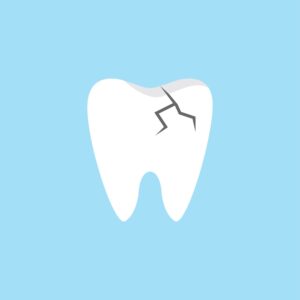Your teeth are tough. They’re built to handle the daily wear and tear of chewing, biting, and grinding food. But even the strongest teeth can break if they’re put under too much pressure. A fractured tooth can happen from something as simple as biting down on something hard, taking a hit to the face, or even just an accident.
If you break a tooth, get it fixed right away. A fractured tooth is more likely to get worse, so don’t wait to call your dentist. Knowing the signs of a broken tooth can help you act fast and get the care you need. Here are common symptoms to watch out for.

1. Visible Cracks or Chips
When you think of a broken tooth, you probably picture a visible crack or chip. And you’re right—sometimes, you can actually see the damage. If you notice a crack, chip, or even a line on your tooth, it’s a good sign something’s wrong.
For small chips or cracks, your dentist might be able to fix the tooth with a simple cosmetic treatment like bonding. But if the crack is deeper, you’ll likely need a dental crown to cover and protect the tooth.
Keep in mind, though, that not all fractures are easy to spot. Sometimes, the crack can be between your teeth or below the gumline, where you can’t see it. That’s why it’s important to pay attention to other symptoms too.
2. Pain or Discomfort
Tooth pain is never normal, and it’s often the first sign of a fractured tooth. When a tooth cracks, it can expose the nerves inside, which can cause a lot of discomfort. You might feel sharp pain when you bite down, chew, or even when something touches the tooth.
The pain can also feel like a constant ache or soreness around the tooth. In some cases, it might even feel like a shooting pain inside the tooth. No matter what kind of pain you’re feeling, it’s a good idea to call your dentist as soon as possible.
3. Swelling Around the Mouth
An untreated fractured tooth can lead to an infection. When a tooth cracks, it creates an opening for bacteria to get inside and reach the sensitive pulp of the tooth. This can cause swelling, redness, and soreness in the area around the tooth.
You might even notice swelling on the outside of your mouth near the injured tooth. An infection is a serious problem, so don’t wait to get help. Call your dentist right away if you notice any swelling or other signs of infection.
4. Sensitivity to Hot or Cold Foods and Drinks
A sharp pain or discomfort when eating or drinking something hot or cold could be a sign of a fractured tooth. While sensitivity can sometimes mean you have weak enamel, it can also mean there’s nerve damage from a crack or break in the tooth.
This happens because the fracture exposes the inner layers of the tooth where the nerves are located. If you notice sudden sensitivity that doesn’t go away, it’s a good idea to have your dentist check it out.
5. Discoloration of the Tooth
A tooth that looks darker or blackened could be a sign that it’s dead or dying. This can happen if a fracture damages the blood vessels and nerves inside the tooth. Without proper blood flow, the tooth can’t stay healthy, and it may start to change color.
If you notice one tooth looks noticeably darker than the others, see your dentist as soon as possible. They can determine if the tooth can be saved or if they need to remove it.
6. Loose or Shifting Tooth
If you have advanced gum disease, a fractured tooth might become loose or even start to shift out of place. This happens because the fracture can weaken the tooth’s structure. Gum disease can damage the bone and tissue that hold the tooth in place.
You might also notice bleeding or irritation around the affected tooth. Don’t wait to call your dentist if your tooth feels loose or moves when you touch it. They can help stabilize the tooth and treat the underlying issue.
7. Difficulty Speaking or Opening Your Mouth
A fractured tooth can make it hard to speak clearly or open your mouth all the way. This is especially true if the fracture is severe or if the tooth is in a spot that affects your bite. You might feel like your teeth don’t fit together properly, or you might have trouble pronouncing certain words.
If you notice any changes in how your mouth moves or feels, it’s a good idea to have your dentist take a look. They can help figure out what’s causing the problem and recommend the best treatment.
What to Do If You Think You Have a Fractured Tooth
If you notice any of these symptoms, see your dentist as soon as possible. They’ll examine your tooth and recommend the best treatment to fix the problem. Depending on the severity of the fracture, you might need a filling, a crown, or even a root canal.
In the meantime, try to avoid chewing on the side of your mouth with the injured tooth. You can also rinse your mouth with warm salt water to help reduce swelling and keep the area clean.
Don’t Ignore a Fractured Tooth
A fractured tooth might not seem like a big deal at first, but it can lead to serious problems. From pain and swelling to infections, the longer you wait, the worse it can get. So, if you think you’ve broken a tooth, don’t wait to call Integrated Dental of Florida right away.
Dr. Melvin Benson will help you get the care you need to protect your smile. Give us a call at 941-270-9755 or request an appointment online.
